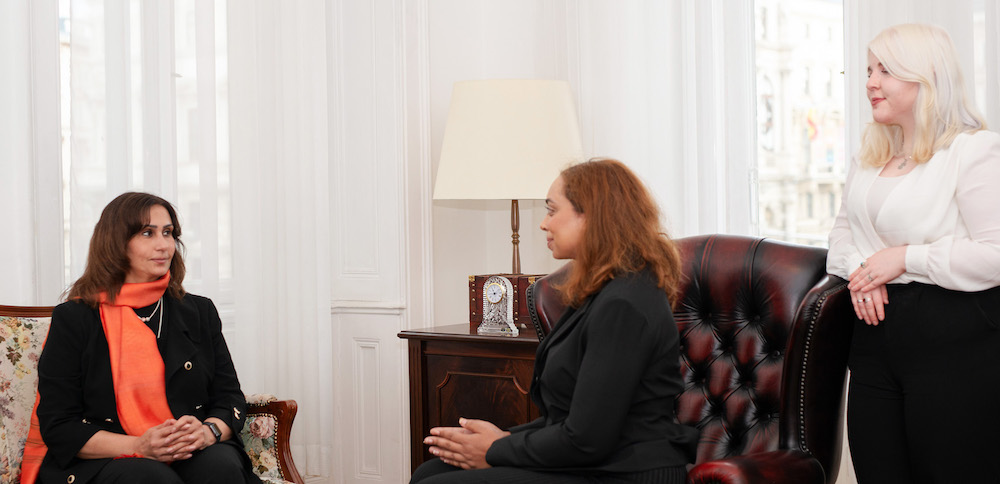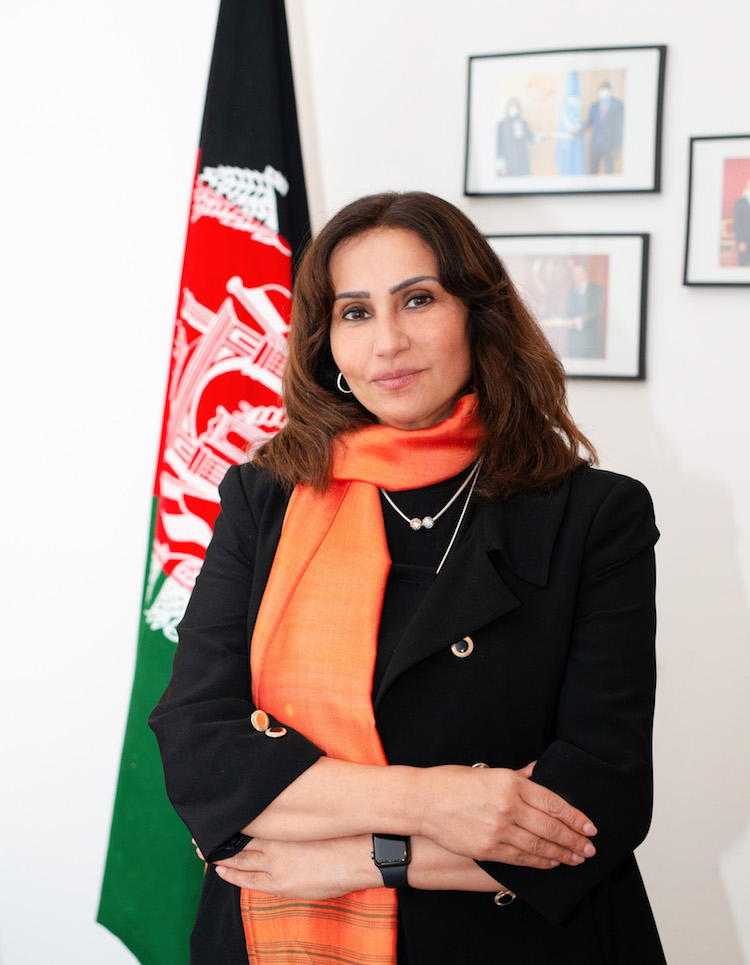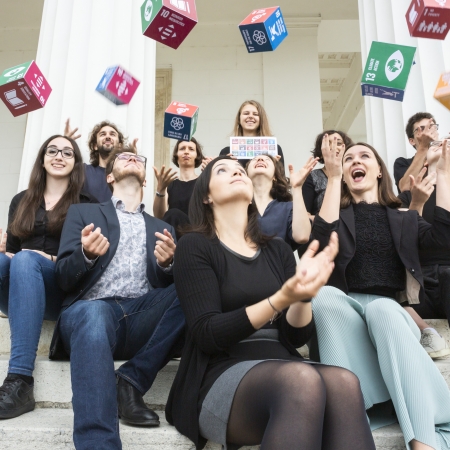Vienna serves as an international centre linking the academic world, international organisations, the United Nations, and foreign representations to a larger international community. Therefore, UNSA Vienna seeks to complement the UN’s SDG Blog with the diplomatic voices of Vienna. Every month, experts and foreign representatives will highlight current affairs in their country directly related to the SDGs. We kick off with our first blog article by Fausia S. Abdoel, with support of Sara Nawrozi (intern at UNSA Vienna), concerning the humanitarian crisis evolving in Afghanistan.
Afghanistan: Taliban Rising, Human Rights and Freedom for Women
SDGs 4 (Quality Education), 5 (Gender Equality), 16 (Peace, Justice, and Strong Institutions)
20 years ago, September 11th marked the day which set off the Global War against Terror. The U.S. started bombing Afghanistan a few weeks later and had the Taliban surrender shortly after. President Bush promised to help bring ‘true peace’ to Afghanistan. America’s longest war and the price for the common Afghan people has been high. More than 46,000 civilians have been killed in the Afghanistan conflict and more than 2.2 million displaced at the end of 2020.
As the Afghan Peace Talks have resulted in the USA’s hasty pull back on the 31st of August, President Ashraf Ghani fleeing the country, and the Taliban settling in Kabul, more than 558,000 people have recently been internally displaced, fleeing their homes to escape violence.
One major concern of the Taliban rising has been that of women’s rights. Will they go back locked up at home, losing their hard-fought-for rights? Taliban spokesman says: “The rights of women in Afghanistan will be respected within the framework of Islamic law."
Social Media has been flooded with images of women protesting on the streets, voices of women fearing for their lives trying to flee the country, and disturbing images of women being flogged, art being destroyed, women protesting after the loss of the Ministry of Women Rights and, according to the latest decree, girls staying at home from school ‘until further notice.’
____________________________________________________
We talked with H.E. Manizha Bakhtari, Afghan Ambassador to Austria and Permanent Representative to the United Nations, about her views on current affairs in Afghanistan.

©Dina Lee. Picture: H.E. Manizha Bakhtari, Ambassador of Afghanistan to Austria in her office discussing current affairs with UNSA.
UNSA: Let’s dive in immediately. Many of us know someone to different degrees in Afghanistan reaching out for support to leave the country now Taliban is in power. Thoughts?
MB: The current developments and the ongoing precarious security situation in Afghanistan had forced millions of Afghan citizens to leave their homes to find safety somewhere across the border, mostly in neighbouring countries.
Afghanistan suffers when young, educated people leave our country, as it impedes our efforts towards reconstruction and development. Our young people are our most valuable asset and our future.
It is in our country’s best interest to prevent our young people from leaving Afghanistan as we need them to rebuild our country. However, people have to flee the country to save their lives. Under the Taliban leadership, our young generation do not see any bright future.
UNSA: How do you feel about the international aid provided?
MB: I wish to thank all our friends in the International Community for all they have done so far for our country, but please do not forget Afghanistan is in a time of need. Right now, people are facing a dire humanitarian crisis. We need the international community’s help to ensure that the progress we have made is not lost.
I hear of too many people desperately asking for help with too little people to turn to. I sometimes feel helpless when I receive messages of help from friends and colleagues. Their life is at risk and I am not able to help them.
UNSA: You are very open about resistance against the Taliban as is being seen on social media. How do you feel about the #SanctionPakistan and #MargBarPakistan [ed. Annihilate Pakistan] hashtags circling the web?
MB: The people of Afghanistan are expressing themselves against injustices every day. It is known for a fact that Pakistan is openly supporting the Taliban. It is a legitimate right to peacefully demand for sanctions against a country that is actively supporting the Taliban.
I am not here to generalize or accuse Pakistan as a whole. A whole nation can’t be blamed for the mistakes of some leaders. Afghanistan and Pakistan enjoy a long-standing history as neighbours. Pakistan has carried out numerous efforts in hosting over a million Afghan refugees. We are grateful for that.
The Taliban’s Representation
UNSA: What is your opinion of the Taliban itself?
MB: On September 7th, the Taliban announced their so-called cabinet. More than half of the declared cabinet members are on the United Nations blacklist for terrorist acts, war crimes and systematic human rights violations. Also, this “so-called cabinet” has no respect for our cultural diversity where 95% of this cabinet belongs to only one ethnical group [ed. Pashtuns]. Afghanistan’s geographical location along with its hospitable people, have always played as a mingling factor for advancement of the world’s different civilizations.
Today marks an important official public national holiday where we honor our national hero Ahmed Shah Massoud. On this day, the Taliban has banned internet access and locked some parts of town to prevent celebrations. No freedom of speech. No freedom of information. No freedom of gathering. They don't even have women and human rights representatives among themselves. Some days ago, their Minister for Education publicly stated that master’s or PhD’s do not mean anything.
UNSA: Yes, many cannot even read and write…
MB: Exactly. They are religious leaders of course, but to be an Islamic religious leader and role model you need to be educated in Islam - this cannot be done if you are illiterate. Being Muslims and practicing Islam doesn’t entail that uneducated people have to lead an Islamic country.

A Female Afghan Ambassador - a Gender Perspective
UNSA: How do you see your own role and future as a woman and ambassador, now as a very open activist against the Taliban?
MB: If I go back to Afghanistan, of course, my life will be at risk. As long as the Taliban are in power, I will not be able to return to my beloved country. I am immensely proud of our women who, without being asked to, continue to be resilient and fight for their rights and freedoms. I stand by them in the fight for freedom, for democracy, and for equality.
UNSA: Are you still officially an ambassador?
MB: Yes, I was appointed by an official government. In these turbulent times we have the Ambassador's Association that helps us build a network among the Afghan Ambassadors around the world. We're consulting with each other on a daily basis. We advocate for our people and work towards establishing a durable peace in the country.
UNSA: Do you feel safe in your role of resistance?
MB: I have to keep resisting. The Taliban are terrorists walking in the streets of Kabul with heavy weaponry. Women are being attacked every day. Women that I personally know. I am proud of their courage but at the same time I’m scared and worried about their future.
UNSA: Do you think women will keep resisting the Taliban?
MB: The international community can’t simply sit and watch the Taliban take over the country. The new generation of Afghanistan is very bright. They use all possible platforms to advocate for themselves - even the little ones. This young generation is also the main reason for my optimism about the future of Afghanistan - they will never allow Afghanistan to return to its darkest times. The Afghanistan of today is vastly different from the Afghanistan that the Taliban controlled twenty years ago. No matter who governs Afghanistan, the Afghan people will not stop fighting for equality and justice.
I know that many people will lose their lives, and many will be detained, but they will not give up. They don’t need anyone to tell them what to do. They just know that the Taliban are against the values they believe in, and they will keep fighting.
Afghan Youth for the Future
UNSA: You have talked a lot about the future of women and briefly mentioned a new generation. Thoughts?
MB: I think the youth will play a major role right now in Afghanistan. Millions of youths in Afghanistan are using social media and are protesting and raising their voices. They peacefully express themselves and demonstrating to the Taliban that Afghanistan has changed.
They cannot force our youth to go back to a time they have not experienced. For this generation, the past 20 years have been the golden years, and this generation knew how to seize their opportunities. In this way, these young people have created a competitive environment in terms of educational and job opportunities.
The youth of today say: “We breathe democracy, and we have the right to express ourselves. We don’t need weapons.” Their plan for our resistance is stronger and they will continue to fight for democracy, freedom, and the values we have worked so hard for in the past 10 years. Our youth is Afghanistan’s moving reality for us and a source of hope for our future.
UNSA: What kind of values do you mean? Most of your rhetoric refers to the educated elite but Afghanistan is big and the provinces widespread.
MB: Yes, you're right. We have several ethnic groups, different school of thoughts, and different voices in Afghanistan. However, as an Ambassador, I stand for the safety of each and every Afghan.
The narrative of “other women of Afghanistan” is very misleading. Even though the rural areas have their own representations and a more conservative approach, families stand for example united for girls’ education, which is now under threat by the Taliban.
UNSA: Do you think they support the Taliban?
MB: We cannot deny that the Taliban have some supporters within our society, which mainly come from the conservative layer of our society - those with little education and those who live in poverty in the remote areas of Afghanistan. So yes, that is a difficult question to answer. There are indeed many different voices, but none of them are truly against freedom of media, expression, and education. They might have different interpretations of education but everyone, from poor to rich, wants to send their children to school - boy or girl.
Peace in Afghanistan
UNSA: There are a lot of talks of freedom and peace. How do you see freedom in the Afghan context?
MB: When I'm talking about freedom, I am talking about the definition of freedom as a Muslim and as an Afghan woman. However, as a Muslim, I believe that freedom means moderation and, above all, freedom of expressing it in your own way. We want to have a free society where everyone can exercise their right to go to school and to pursue a career.
UNSA: Any last words for us?
MB: I want to emphasize once more that the Taliban are a terrorist group. They have taken their power by force going against all international UN mandates: The US-Taliban Peace Deal and UNSC Resolution 2513. I urge the international community not to recognise Taliban. The Taliban have no respect for democracy, women’s rights, human rights, and for the people of Afghanistan.
The Afghan people deserve an inclusive government that represents all of Afghanistan, one that champions women’s rights, the freedom of press and media, the freedom of expression, and the rights of all Afghans to pursue happy and healthy lives.

